#Measures of Men
Text

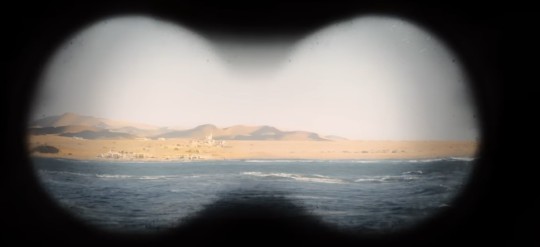
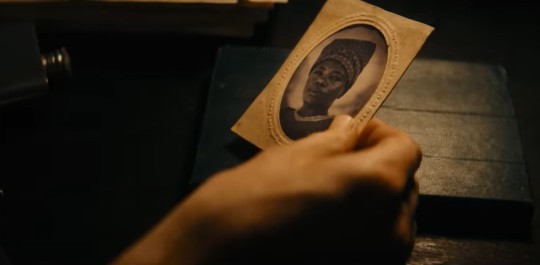

Der vermessene Mensch (2023) - Lars Kraume
Sie werden sehr viele schöne Dinge zurücklassen auf ihrer Flucht.
#der vermessene mensch#measures of men#lars kraume#Girley Charlene Jazama#Leonard Scheicher#film#herero#nama#colonialism#german film#film still#watched on the flight STL FRA#watched in december 2023#german colonialism
5 notes
·
View notes
Text
A Movie Confronts Germany’s Other Genocide
“Measures of Men” tells the story of the systematic massacre of Herero and Nama people in what is now Namibia. Its maker hopes the film will bring a debate about Germany’s colonial guilt into the center of society.

Leonard Scheicher, left, and Girley Jazama in “Measures of Men,” which tells the story of the Herero and Nama genocide in what now Namibia through the eyes of a German anthropologist.Credit...Julia Terjung/Studiocanal GmbH
By Thomas Rogers
Reporting from Berlin
March 31, 2023
Germany is often praised for its willingness to confront the darkest moments of its history, but in recent years, activists have pointed to a blank spot in the country’s culture of remembrance. Decades before the Holocaust, Germany perpetrated the 20th century’s first genocide: From 1904 to 1908, German colonial officials systematically killed tens of thousands of Herero and Nama people in what is now Namibia. This atrocity is little known outside academic circles, and there are few memorials or pop cultural depictions of those events.
Now, a new movie, “Measures of Men,” aims to change that and bring a debate about Germany’s colonial guilt into the center of society. The glossy film, directed by the German filmmaker Lars Kraume, tells the story of the killings through the eyes of a German anthropologist. Aside from playing in movie theaters, where it opened last week, “Measures of Men” had a special screening for lawmakers in Germany’s Parliament, and was the focal point for a series of events at the Humboldt Forum, a central Berlin museum housing ethnological items. Its distributor, Studiocanal, said in a statement that it was planning to show the film in school and educational contexts.
“Measures of Men” has also prompted a new discussion in the German media about what many see as Germany’s sluggish attempts to come to terms with its colonial past. In recent years, the country has moved to return numerous artworks acquired during the colonial period, but the process of ratifying a reconciliation agreement between Namibia and Germany has stalled, and thousands of African human remains, transported to Germany from its colonies, remain in institutional collections.
In an interview in Berlin, Kraume, 50, explained that his movie was partly inspired by the 1978 NBC mini-series “Holocaust,” an early fictionalized TV depiction of the Shoah, which played a key role in spreading awareness of German guilt after it was broadcast here. “You have the possibility through cinematic storytelling to reach an audience that doesn’t engage so much with history books,” he said, adding that he hoped his film would be the first of many, much in the way “Holocaust” paved the way for films like “Schindler’s List.”

Lars Kraume, who directed “Measures of Men,” said, “You have the possibility through cinematic storytelling to reach an audience that doesn’t engage so much with history books.”Credit...Gordon Welters for The New York Times
“Measures of Men,” which was filmed in Berlin and Namibia, focuses on an ambitious German ethnologist (Leonard Scheicher) who develops a fascination with a Herero woman (Girley Jazama) after measuring her cranial features as part of his research. His fixation leads him to travel to German South West Africa (now Namibia), where he witnesses and eventually become complicit in the colonial slaughter.
“It’s not just a film about the genocide,” Kraume said, “but also about ethnologists who want to explore foreign cultures, but destroy them.”
Many of the scenes were based on real events of the genocide, which took place during a conflict between Germans and Africans known as the Herero and Nama War. After thousands of Herero men, women and children fled into the Omaheke Desert in 1904 to escape the fighting, German troops sealed off its edges and occupied the territory’s water holes, leading many to die of thirst. Lothar von Trotha, the governor of the colony, then issued a proclamation calling for all remaining Herero to be killed.
After the Nama joined the fight against the German colonizers, they were also targeted, and colonial officials set up concentration camps, ostensibly to provide labor for German-owned businesses, in which hundreds of prisoners died. The film depicts real facilities in one such camp in which the decapitated heads of Herero and Nama were boiled and cleaned for export to German ethnological institutions. Thousands of skulls of unclear origin remain in German collections to this day.
Kraume long wrestled with how to tell the story as a European filmmaker, and said he had decided to depict it from a German perspective for fear that centering it on African protagonists would represent a form of “cultural appropriation.” At one point in the development, he hoped to structure it similarly to Hollywood films about the Vietnam War, such as “Platoon” and “Apocalypse Now,” that center their plots on conflicts between “good” and “bad” American soldiers. “But there were actually no good Germans,” Kraume said.

Girley Jazama, who plays the movie’s female lead, discovered that her great-grandmother has been born in a German-run concentration camp while researching to play the role.Credit...Gordon Welters for The New York Times
Jazama, an acclaimed Namibian actress who plays Kezia Kambazembi, the film’s lead female role, learned German to play her part. In preparation for the role, she spoke to relatives about her family’s connection to the genocide and discovered that her great-grandmother had been conceived in a German-run concentration camp. “My ancestors need to be at peace,” she said in an interview. “That’s why I became a part of this story.”
Jazama said that, though the film had largely been made to spur discussion in Germany, it had also been a talking point in Namibia, where the events of the genocide had often been passed down via family members. “A lot of people are grateful,” she said, recalling that one audience member had shared appreciation that “now there is a visual representation of what happened, versus just it being told orally.”
The reaction in Germany has been more mixed. Writing in the Frankfurter Allgemeine Zeitung newspaper, the critic Bert Rebhandl wrote that the film focused too much on “German self-understanding” while pushing African perspectives to its edges. A writer in the Süddeutsche Zeitung argued that the film depicts too little of the genocide to transmit the scope of the killing and it does not do “justice to the horror.”
Henning Melber, a political scientist who has written extensively about German colonialism, said that criticism of the film shouldn’t distract from its potential role in remedying what he described as Germany’s “colonial amnesia.” He said that the film “triggers a debate in a wider German public in a way that none of us academics can achieve.”
Kraume emphasized that, although “Measures of Men” was meant to appeal to a mass audience, it was an explicitly “political film,” and that its rollout was partly engineered to spur a discussion. He hoped the screening for lawmakers would drive politicians to work harder at compensating the Herero and Nama, he added.
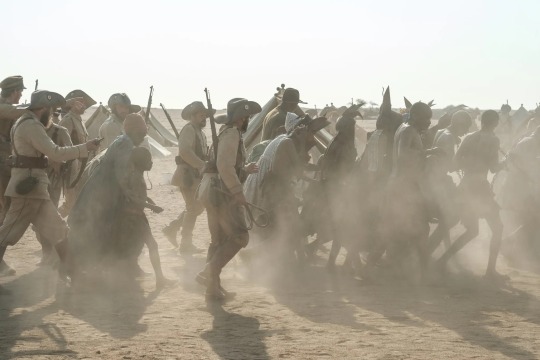
A scene from “Measures of Men.” In 1904, thousands of Herero people fled from German soldiers into the Omaheke Desert, where many died of thirst.Credit...Willem Vrey/Studiocanal GmbH
Although Namibian and German authorities agreed in 2021 on the terms of a reconciliation agreement, including around $1.1 billion in aid that Germany would pay over the next 30 years, the process has since come under fire from groups representing victims’ descendants, who argue that amount is too low, and say they were unfairly left out of the negotiation process. The Namibian government has since backtracked on plans to ratify the agreement, and the German authorities have resisted calls by the Namibians to reopen talks.
Kraume said Germany’s president, Frank-Walter Steinmeier, should travel to Namibia and officially apologize for the genocide, and that all human remains still held in Germany should be returned. “Europe has done far too little to reconcile with victims,” he said. “I think cinema allows us to awaken emotions, and implant images that can let you see events differently,” he said. “But this is only the beginning of the discussion.”
16 notes
·
View notes
Text
youtube
Der vermessene Mensch (dir. Lars Kraume, premiered February 2023 at the Berlin International Film Festival), starring Leonard Scheicher as an ethnologist, tells the story of the Herero and Namaqua genocide which was perpetrated in German South-West Africa (present-day Namibia) between 1904 and 1908
I believe this flim has been released in cinemas in Germany ? I'd be curious for reviews if any of you have seen it ?? from the trailer alone it seems to follow the perspective of a 'sympathetic colonist', rather than the Herero, but I don't want to judge or criticise since I've not seen the actual film. and it's still important that these stories are told at all
2 notes
·
View notes
Text
So I just watched "Measures of Men" in my History Class, and I have to say that the Proffessor you're supposed to hate is absolutely Adorable while he's in Africa.
I just love him and his fossils.
0 notes
Text
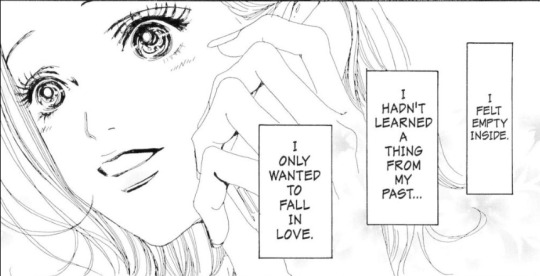
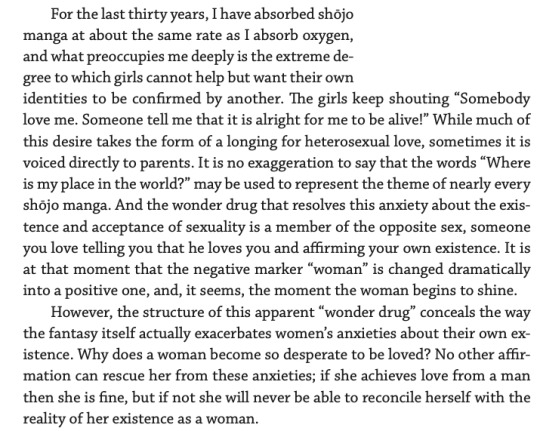
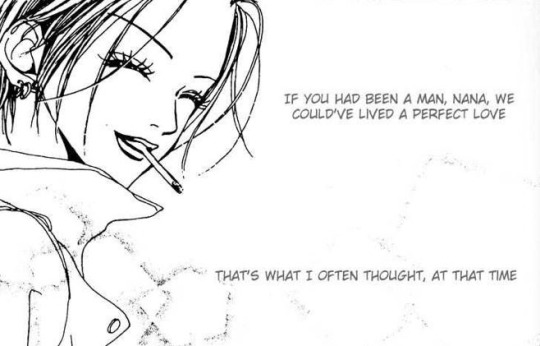

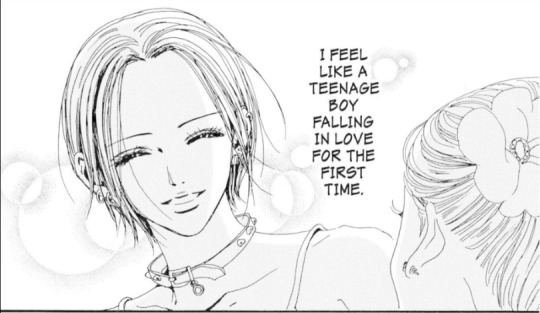

Nana x "Where is My Place in the World? Early Shōjo Manga Portrayals of Lesbianism" by Fujimoto Yukari (tr. Lucy Fraser)
#augh#nana#upl#queue#when I first read this article I thought of them tbh like...they both come up against the ideas here in their own ways#hachi trying to moor herself & achieve maturity by pursuing relationships with men#nana wrestling with how she feels she can't succeed if she's tied to ren/managing feelings abt wanting to keep hachi close#a future with each other is not an option - both in-text and in a genre/meta sense - bc there are no men in that roadmap#nana feels so self aware in this way. like especially with hachi: by all external measures she 'grows up' - but it leaves her isolated#& still yearning for that connection she had with nana...but it's not possible within the confines of their stories and the genre#anyway i'm aware there's lesbians in shojo but the point of the article is examining why this is an anomaly. definitely recommend reading!
3K notes
·
View notes
Text
Gandalf said ‘do not offer me that’, Galadriel said ‘I would be a queen, great and terrible,’ but Elrond said ‘get that the fuck away from me’ and this is nonsensical.
The other keepers of the elven rings were most challenged by the One, why not Elrond? Is his struggle merely hidden? Is it his Maia blood? Is it simply his mixed blood? Is that why Aragorn withstood, too?
Canonically the race of men are most easily corrupted, yet Elrond half-elven, who is almost 40% man, doesn’t notably bat an eyelash. Why?
#Probably by virtue of his strange upbringing Elrond received a measure of every talent there is to be given#everything from the magic of his foremother Luthien to the supreme skill and knowledge of his foster fathers.. which makes him remarkable#But what does that make him compared to Sauron? Elrond is obviously Special with a capital S#One goes so far as to say he is the weapon the entire first age was about forging; he and elros#And in Arwen almost every ethnic group of elves and men ever finally converge#And in some time perhaps Eriol is the final descendant of this line#but that’s a different myth#Yet I can’t help but feel its essential to understanding the resounding movement of Tolkien’s pieces#however unfinished they may be..#Anyway#lotr#lotr fotr#lord of the rings#the council of elrond#Elrond#elrond peredhil#Tolkien#jrr tolkien#silm references#Silm#lotr headcanons#middle earth#lotr hc#tolkien headcanons#tolkien lore#elven rings of power#Etc.
168 notes
·
View notes
Note
hey i know your post about your mom was mostly just a personal vent, but i have to say, do you realize that also happens with trans girls and their fathers? literally happened to one of my friends. i’m not trying to downplay your experience or something but i found it strange that you seem to think this is something that only affects transmascs
i have one question for you: so fucking what?
i don’t doubt that trans girls have experienced similar things and yeah, that’s bad too, but what the fuck does that have to do with me and the specific things i’m facing as a result of being a trans man? i never said “look at this thing that happens to ONLY trans men and NO ONE ELSE,” i just said “hey, isn’t this thing that happens to a lot of trans men, including myself, fucked up?”
i would also like to point out that what you’re talking about is in fact a different (albeit similar) thing. the way cis people treat trans people can differ dramatically based on the cis person’s gender because their commitment to gender roles is, like, a major part of problem. the specific way a cis mother reacts to her trans son’s transition is often going to be very distinct, while a cis father will likely respond to his trans daughter in a different but equally distinct way.
what i’m talking about is a very specific kind of ownership and control and self-victimization and total lack of boundaries masquerading as love and care and maternal concern that cis women (i would argue white cis women in particular) project onto their transmasc kids when we do literally anything to our bodies. i’m talking about a phenomenon which is closely related to the way moms often pass eating disorders onto their daughters (or children they view as daughters) because they see a body that looks something like theirs and project all of their insecurities and ideals onto it. i’m talking about a form of parental transphobia and projection that’s specific to the dynamic of a cis mother and her child who was “supposed to” be her daughter.
if you’ve never felt that, you’re not even remotely qualified to tell me shit about how i should be talking about that experience, and if you couldn’t recognize that experience when you read my post, i’m guessing you probably haven’t experienced it because the replies to that post made it very clear to me that anyone who has experienced it firsthand immediately knew exactly what i meant.
like, yeah, cis dads also project onto their trans daughters, but are they likely to have a reaction like running away with actual tears streaming down their face? do you expect them to passive aggressively make comments about how sad their kid’s transition makes them, how it’s such a difficult emotional time, how it’s so tragic because their kid’s body was so beautiful before? do you think their go-to transphobic reaction will be weaponizing their emotions? i’m sure there are some dads out there who are like that, but i think we can agree they’re in the minority because that’s not how cis men are taught to react and parents like this tend to be pretty damn committed to following the gender roles they were taught.
and even if i’m wrong and our experiences are exactly the same, let me reiterate that i never said this was an experience exclusive to trans men. all i said is that it happens to us. that’s just a statement of objective fact.
this started in my life when i got my hair cut short for the first time almost a decade ago and it has not stopped since. i’ve watched my mom cry over me changing my name and respond to being asked if my happiness matters more to her than my name by saying “i care about both”, i’ve watched her melt down in a mall over me getting a suit for prom and give me the silent treatment for days after, i’ve heard her plead with me to stop t because it “looks unnatural” and she’s just so “concerned for my health”, i’ve watched her stare at me post-op and say “my poor baby” over and over like she’s looking at my corpse in a casket. i’ve watched her turn herself into the victim of every single aspect of my transition. i’ve had to live with this for 9 years and spent the early years of the pandemic literally locked in a house with it. this has been my entire adolescent and adult life, and the question of if i’ll have to cut her off someday (and maybe never see my cat or my little cousins who i love more than anything in the world ever again as a result) haunts me every single day.
who the fuck are you to tell me how to talk about that?
#i hope you weren’t expecting me to take this in good faith and give a nice measured response#because just so we’re clear you didn’t have a chance in hell of doing anything other than pissing me off#like in case you forgot i am a real person who this is happening to#in what world did you think i’d care about how an anonymous stranger feels about how i describe it when im the one who has to live it#idk man. some of y’all clearly do not see me as an actual person capable of emotion and it shows#also like. using a friend’s experience is wild bc 1) how do you know it was the same if it didn’t happen to you#and 2) would that friend really want you using their experience against another trans person experiencing something similar?#anon hate#ask answered#examples of transandrophobia#transandrophobia#transandromisia#transmisandry#virilmisia#virilphobia#anti transmasculinity#transmascphobia#trans men
227 notes
·
View notes
Text
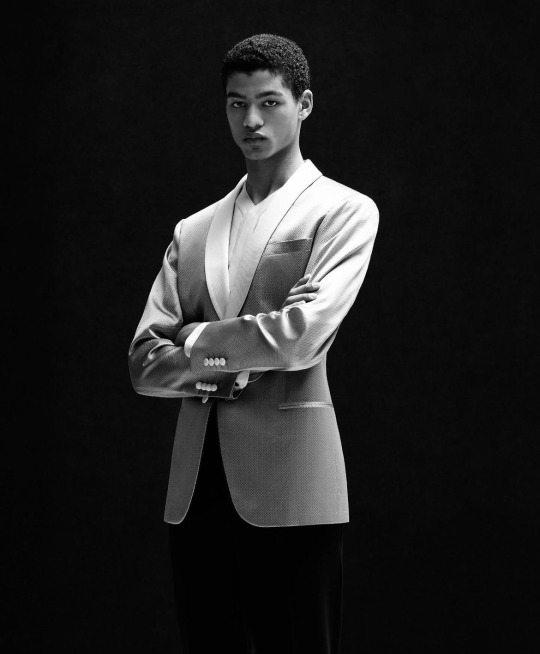


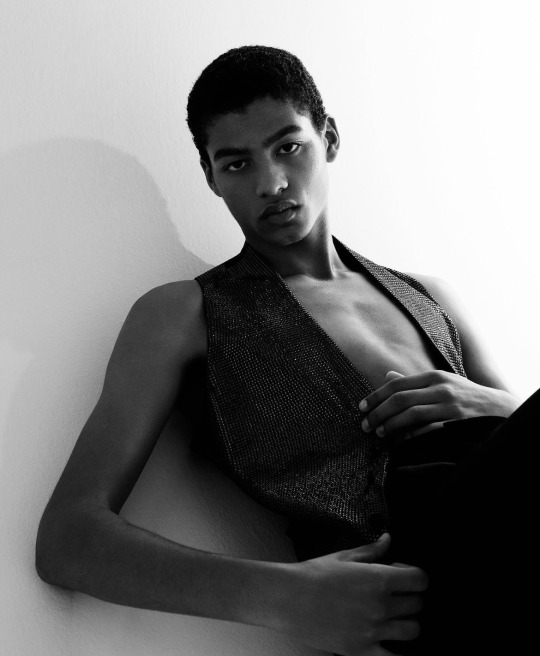
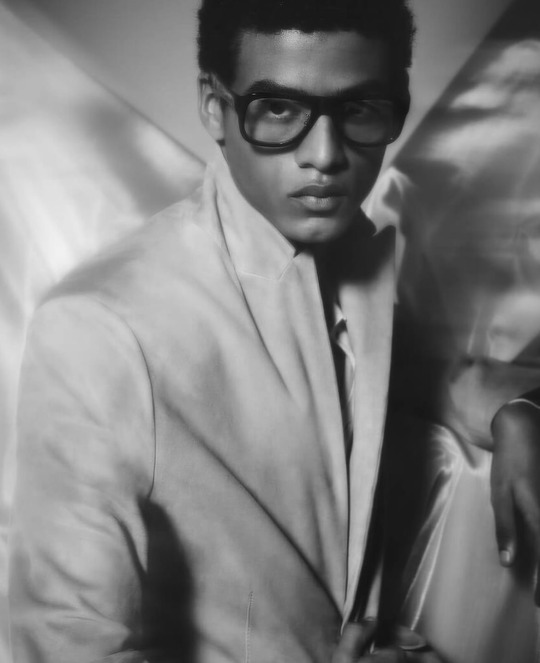
RAPHA
www.beau-gar.tumblr.com
#rapha keijzer#giorgio armani#spring 2024#black man#black model#handsome#menswear#fashion#la sape#sapeurs#blackmalemodel#menswearfashion#dandy#sprezzatura#male model#mensfashion#black models#men's fashion#parisian style#gq style#fashion style#italian style#mens style#style inspiration#street style#style#made to measure suits
84 notes
·
View notes
Text
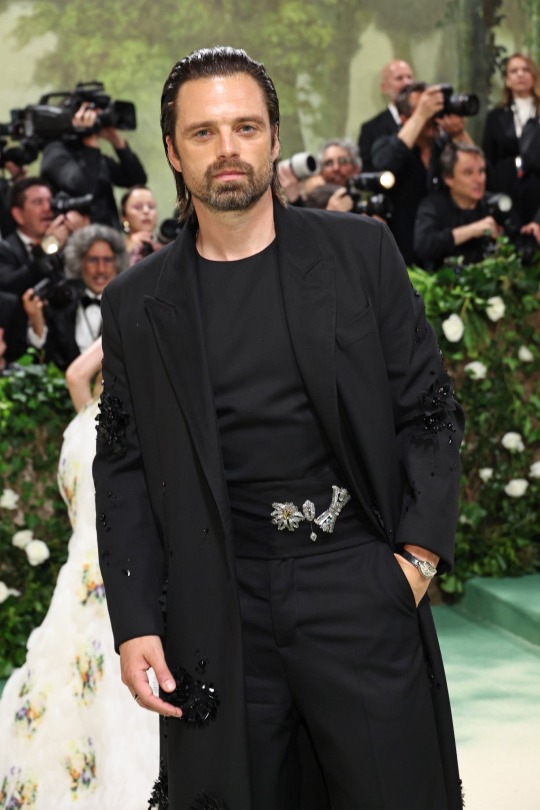



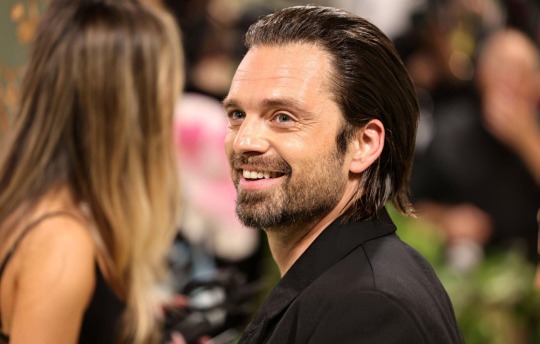
DADDY’S ARRIVED @ THE METGALA
“You ever see a guy this handsome walkin’ the streets? He’s gonna get arrested because he’s killing all the ladies-
POW 💥 POW 💥 POW💥
#sebastian stan#seb stan#sebby stan#sebby baby#daddy seb#daddy sebastian#met gala#the mark of greatness#the measure of beauty amongst men
85 notes
·
View notes
Text
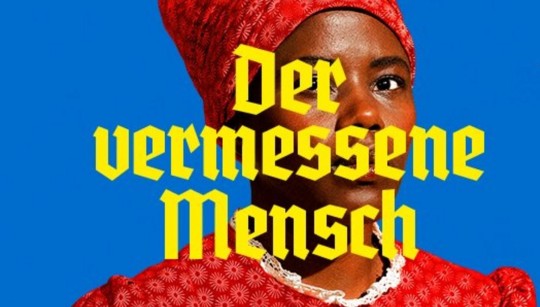
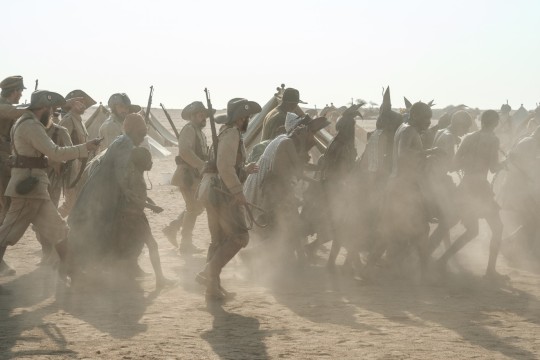

Der vermessene Mensch (2023) - Lars Kraume
Ureinwohner verschwinden wie der Schnee in der Sonne der aufgehenden Zivilisation.
#der vermessene mensch#measures of men#lars kraume#film#film still#quote#colonialism#herero#nama#german film#german colonialism
1 note
·
View note
Text
Thinking about desperately humping a girl's thigh and then being forced to lick up the mess I make
#just her holding me by my hair and not letting me up until ive licked up all the wetness ive left on her thigh#and then forcing me to eat her pussy or choke on her cock#just for good measure#my post#nblw nsft#nsft lesbian#nsft wlw#queer nsft#sapphic nsft#wlw nsft#nblw and wlw only#lesbian nsft#wlw and nblw only#men dni#trans nsft#nsft concept
1K notes
·
View notes
Note
I remember Machete has tiny feet, but exactly what size shoes does he wear?
.
#hard to say#his shoe size might be just one of those things he doesn't particularly like revealing to people#very likely small enough that he has trouble finding anything to wear in most men's sections#I'd like to think that once he can afford it he starts to have some of his shoes custom made#and eventually goes off the deep end and developes a brand loyalty for Louboutins in particular#which isn't great for your finances but let him have his bougie red soled heels if he wants he's worked hard for them#modern au#in canon setting proper standardized shoe sizes don't exist yet so everything is made to measure#answered#chrlxx#those are his hooves
161 notes
·
View notes
Text

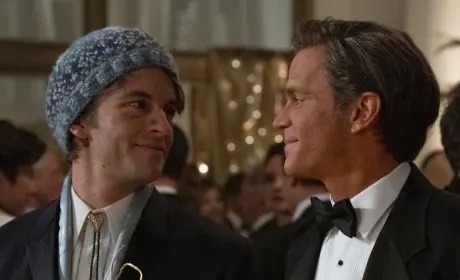
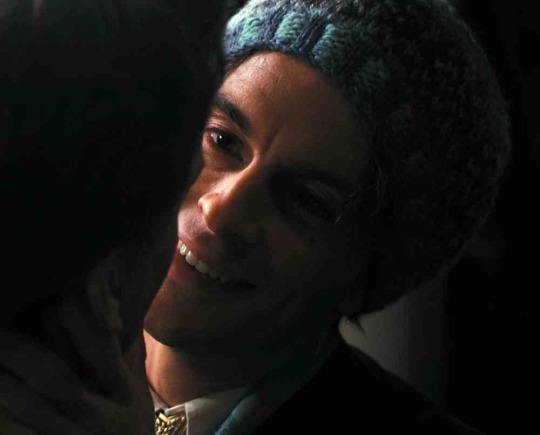

Because of a conversation that I was in earlier I can’t stop thinking about this scene 🥹🩷.
Tim looking at Hawk with those big brown eyes and so happy and Hawk just asking “what?” And Tim going “it’s feels like we are on a date” 🥹
Hawk mentioning that he may make a pass. Them flirting even after all these years just 😭
Then after going outside to meet Tim after telling off Dave and apologizing. Tim giving his big beautiful and moving speech. “You were my great, consuming love. I have no regrets” and Hawk kissing him 🥹.
“Would you look at that? Out in public and the world didn’t come to an end” Tim teasing Hawk a little bit, but Tim was so happy and in love and finally got what he wanted after all of these years. All he wanted was public affection from Hawk and he finally got it 😭🩷
I know this scene and episode ends with Tim telling Hawk to go home, but they were still so in love.
My heart still breaks that Hawk wanted to stay, but it was too late.
They loved each other.. Beyond Measure 🥹🥹
(Photos I grabbed from a quick Google search 🩷)
#
#fellow travelers#hawkins fuller#hawk and skippy#hawk x skippy#skippy x hawk#tim laughlin#hawk fuller#jonathan bailey#matt bomer#old men in love#beyond measure#they were each others great consuming love
115 notes
·
View notes
Text
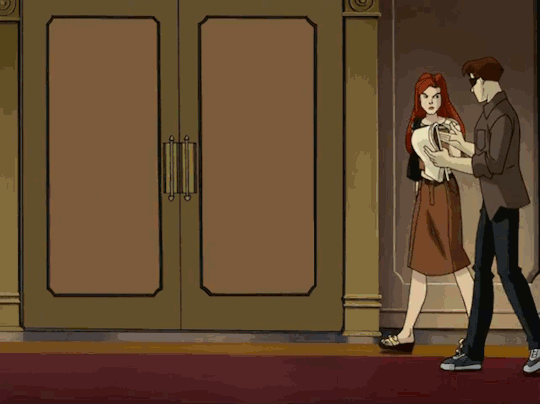
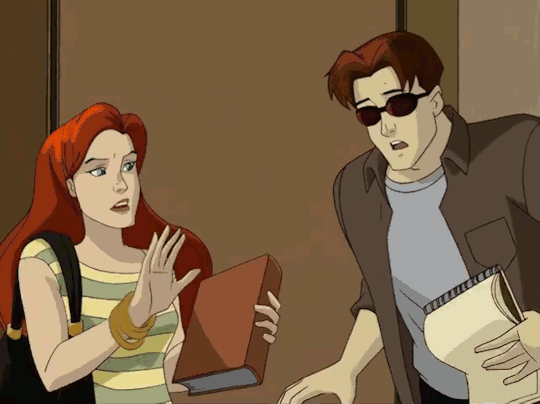
Jean throws Scott under the bus to continue Kitty's driving lessons
#Jean Grey#Scott Summers#LMFAO#X-Men Evolution#X-Men Evo#X-Men#2000s#X-Treme Measures#gifs#omg#this is all so much funnier than I remembered#Jean#pls
73 notes
·
View notes
Note
for real WHERE does the idea that [utdr humans] are nongendered so that "you can project on them" come from. their literal character arcs are about NOT being a blank slate to be filled in by the audience
i think i understand the assumption on some level for undertale, because there is a very intentional effort to make you identify with the "player character" in order to make your choices feel like your own (the beating heart of undertale's metanarrative lies in giving you an alternative path to violence against its enemies after all, and whether you're still willing to persue it for your own selfish reasons. YOUR agency is crucial).
of course, the cardinal plot twist of the main ending sweeps the rug from under your feet on that in every way, and frisk's individuality becomes, in turn, a tool to further UT's OTHER main theme: completionism as a form of diegetic violence within the story. replaying the game would steal frisk's life and happy ending from them for our own perverse sentimentality, emotionally forcing our hand away from the reset button.
i think their neutrality absolutely aids in that immersion. but also, there's this weird attitude by (mostly) cis fans where it being functional within the story makes it... somehow "editable" and "up to the player" as well? which is gross and shows their ass on how they approach gender neutrality in general lol.
but also like. there's plenty of neutral, non PCharacters in undertale and deltarune. even when undertale was just an earthbound fangame and the player immersion metanarrative was completely absent, toby still described frisk as a "young, androgynous person". sometimes characters are just neutral by design. it's not that hard to understand lol.
anyone who makes this argument for kris deltarune is braindead. nothing else to say about it.
#this is a very difficult topic to discuss imo because on Some level I don't completely disagree with people who make that argument for chara#in SPIRIT. if not in action. like my point still stands characters can just Be neutral. and if that level of customization had been intended#well Pokemon's been doing the ''are you a boy or a girl'' shtick for ages. no reason why that couldn't have been included as well#but i do feel that we're supposed to identify with chara within the story. not as in chara is us but as in we are chara#and i think someone playing the game without outside interferences and (wrongly) coming to the conclusion that chara IS literally#themselves in the story. and thus call them by their own name (the one they likely inputted at the start) and pronouns#will be someone who grasped undertale's metanarrative more than someone who went in already spoiled on the NM route who thinks of chara#(and on some level frisk as well) as completely separate from us with independent wills and personhoods at any time#who treats them as nonbinary. even if their approach is more ''appropriate'' to a gender neutral person#systematic error vs manually changing every measure to fit what you already think is going to be the correct result. ykwim?#of course this opens a whole new parentheses while discussing the game outside of your personal experience#because even if you DO see chara as a self insert then they are a self insert for EVERYONE. women men genderqueer people#i don't call chara ''biscia'' even though that's what i named the fallen human in my playthrough. neither do i use they because i also do#if you're describing the character/story objectively in how they are executed then you're going to talk about them neutrally#because you ain't the only sunovabitch who played the darn game sonny#so like. either way you turn it. even in the most self insert reading you'd STILL logically use they/them so ¯\_(ツ)_/¯ git gud#answered asks
102 notes
·
View notes
Text
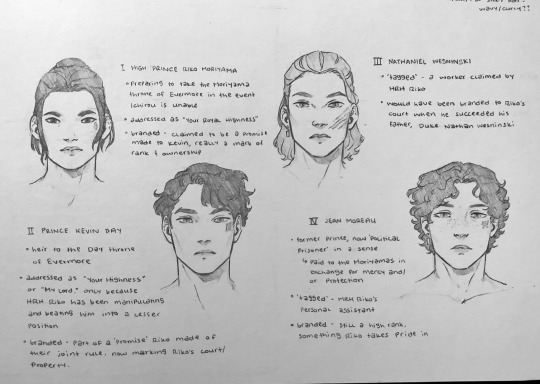
Thoughts on prince Riko’s “perfect court” before anyone escaped Evermore ( @thefoxesraven pls remind me if it was you with the branding vs tagging idea on that insta live)
@snazzy-jas-z-is-a-fan-of came up with SO MUCH of the possible politics and family ties of this au, it was incredible to watch and I think I finally understand enough to post about it 😂 there’s a balance of power between the two branches of Evermore royalty, which balance is shifting slowly to the Moriyamas and by the end of the story belongs solely to them with Ichirou as king. I’ll try to explain it in a different post if there’s interest

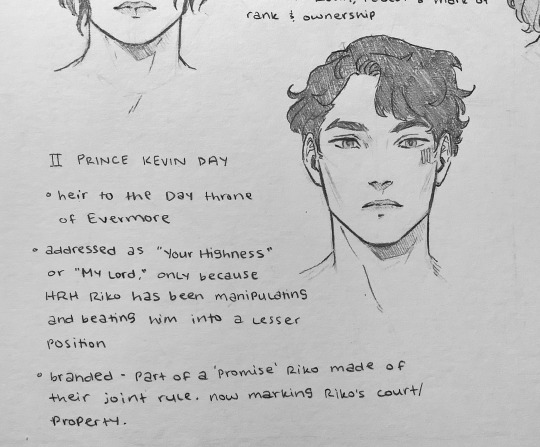

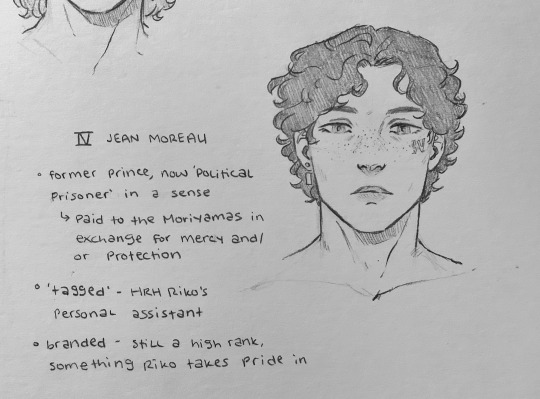
(And lest we go a day without Abram angst: he does in fact get his brand and more, when he’s taken back to Evermore and Riko takes the chance to reclaim his property ‘like he should have done to begin with’.)
#CRIES I WROTE THIS WHOLE POST TAGS AND ALL AND LOST IT TO THE VOID#hhhhhh anyway. new designs who this#I think I’ve drawn riko maybe like. twice. and i wanted to give Jean curly hair#which 👀👀👀👀 sir#AND he gets to grow it out??#oh but it hurts to think about why Kevin and Jean#who both are closer and spend more time with riko than Nathaniel#would want to keep their hair short while at evermore#in this the ‘long haired men’ au#TOO MANY ANGSTY THOUGHTS TONIGHT#but thank you so much jas for your thoughts and incredible world building#AND I could go on MORE about the unnecessary measure of Riko branding Jean#it was just to be cruel and mock him and cause him pain#AND I COULD GO ON ALSO ABOUT ABRAM AND BRANDING#but I WONT because I learned there’s a TAG LIMIT#so if you want to know. you know where to find me#dms are open etc#im also on discord and insta#30 tags smh#fan art#my art#aftg#all for the game#royal au#neil josten#kevin day#riko moriyama#jean moreau#perfect court
197 notes
·
View notes